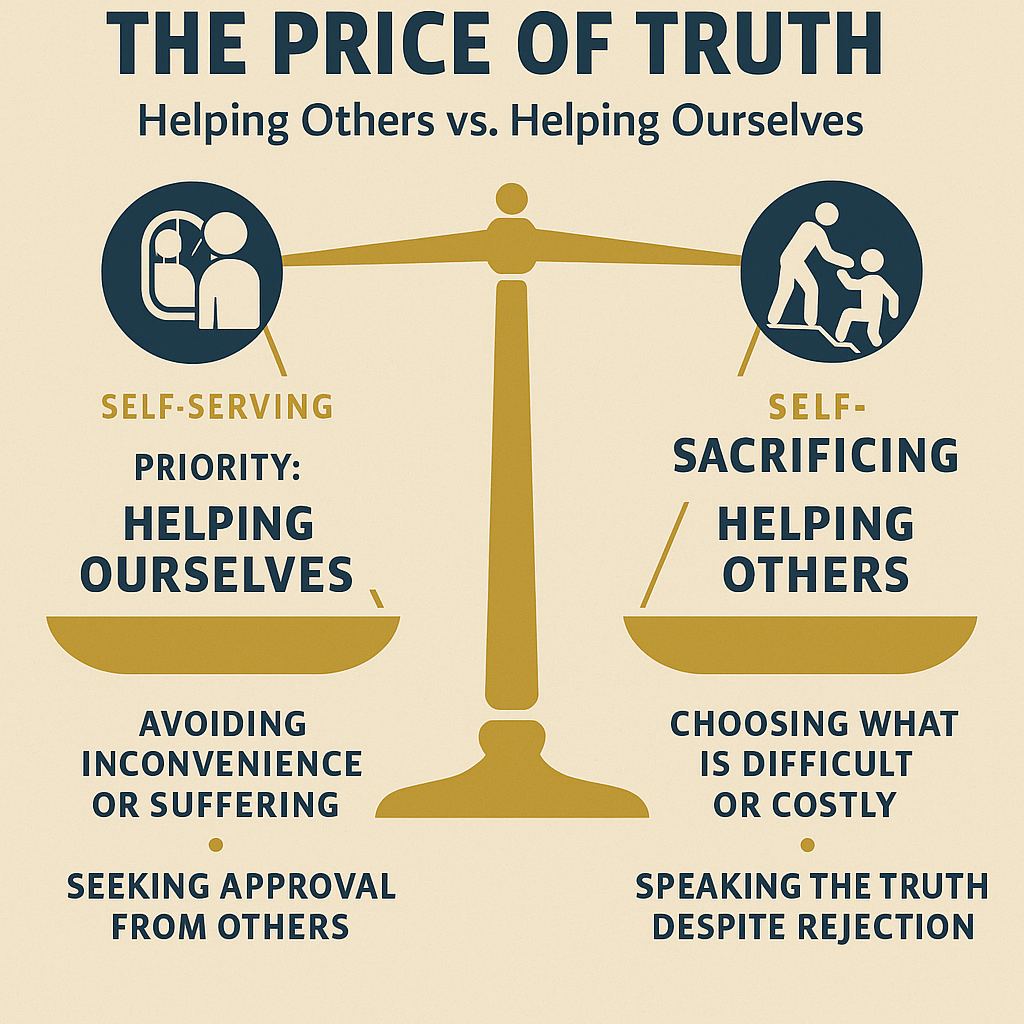Quote:
“When you want to help people, you tell them the truth. When you want to help yourself, you tell them what they want to hear.”
— Thomas Sowell
I. Introduction: The Cost of Truth
Thomas Sowell’s insight strikes at the heart of human integrity and leadership.
Telling the truth, especially when it is uncomfortable, requires courage, selflessness, and a genuine commitment to the good of others. In contrast, telling people what they want to hear — flattery, justification, or enabling — often serves selfish motives: popularity, power, financial gain, or avoiding conflict.
This quote sits at the crossroads of many of the deeper themes we’ve explored — understanding emotion vs logic, breaking free from societal programming, avoiding idol worship, and striving for personal and societal growth.
II. Why Is Telling the Truth Hard?
- Fear of Rejection:
Truth is often uncomfortable. When we tell people hard truths, we risk alienating them.
(E.g., speaking up against a toxic culture can lead to exclusion.) - Desire for Approval:
Human beings are wired for belonging. Telling people what they want to hear offers instant social rewards — smiles, gratitude, status. - Economic Incentives:
In commerce and politics, success often depends on popularity and customer satisfaction. Hard truths can threaten careers, markets, and institutions. - Emotional Avoidance:
Speaking uncomfortable truths demands personal emotional regulation. It is much easier to avoid internal discomfort by simply pleasing others.
Thus, the path of least resistance — telling people what they want to hear — is deeply tempting.
III. Telling the Truth: A Form of Real Love and Leadership
Telling the truth, particularly when it is difficult, is an act of love, not aggression.
It is rooted in:
- Genuine Care:
You risk your comfort for someone else’s growth. - Moral Courage:
You stand against the tide of emotionalism, convenience, or corruption. - Long-Term Vision:
You choose sustainable, meaningful development over short-term applause.
Christ and Paul consistently modeled this principle: they told society hard truths about injustice, hypocrisy, greed, and false religiosity — even when it cost them their lives.
The Founding Fathers, too, risked everything by telling Britain (and the colonial elite) the truth about liberty.
IV. Telling People What They Want to Hear: A Form of Self-Service
When you prioritize your own ease over someone else’s growth:
- You Enable Dysfunction:
By refusing to challenge harmful patterns, you let them fester. - You Maintain the Status Quo:
Systems of oppression, corruption, and mass manipulation rely on collective self-deception. - You Trade Integrity for Comfort:
Your own conscience weakens over time, as self-preservation becomes your guiding star.
This is the tactic of the global elites and oligarchs we’ve discussed: they distract the public with pleasure, consumerism, and lies because telling the truth would risk exposing their plunder and manipulation.
V. Breaking the Cycle: Choosing Truth with Wisdom
- Tell the truth with love and skill:
Truth without compassion becomes cruelty; compassion without truth becomes deceit. - Cultivate emotional maturity:
Be willing to feel the discomfort of being disliked or misunderstood. - Value long-term growth over short-term approval:
Real change takes time. Sow seeds even if you won’t see the harvest. - Bridge with understanding:
As Jung said, people misunderstand those they do not understand. Listen deeply first — then speak the truth. - Strengthen moral centers:
Like Covey taught, root your life in unchanging principles, not the whims of the crowd. - Resist idol worship:
Don’t idolize popularity, fame, or comfort. Serve truth, even at cost. - Create “mini-cultures” of honor:
Build communities that value truth-telling — families, friendships, organizations.
VI. Conclusion: A Choice Between Two Paths
Every day, we are faced with the decision:
Will we help ourselves — by telling people what they want to hear?
Or will we help others — by telling them what they need to hear?
The first path is easier, more immediately rewarding, but ultimately hollow.
The second path is harder, lonelier at times, but builds true character, genuine relationships, and a better world.
As Christ taught, the truth shall set us free — but first, it often makes us uncomfortable.
In a world drowning in comforting lies, truth itself becomes an act of rebellion and love.






